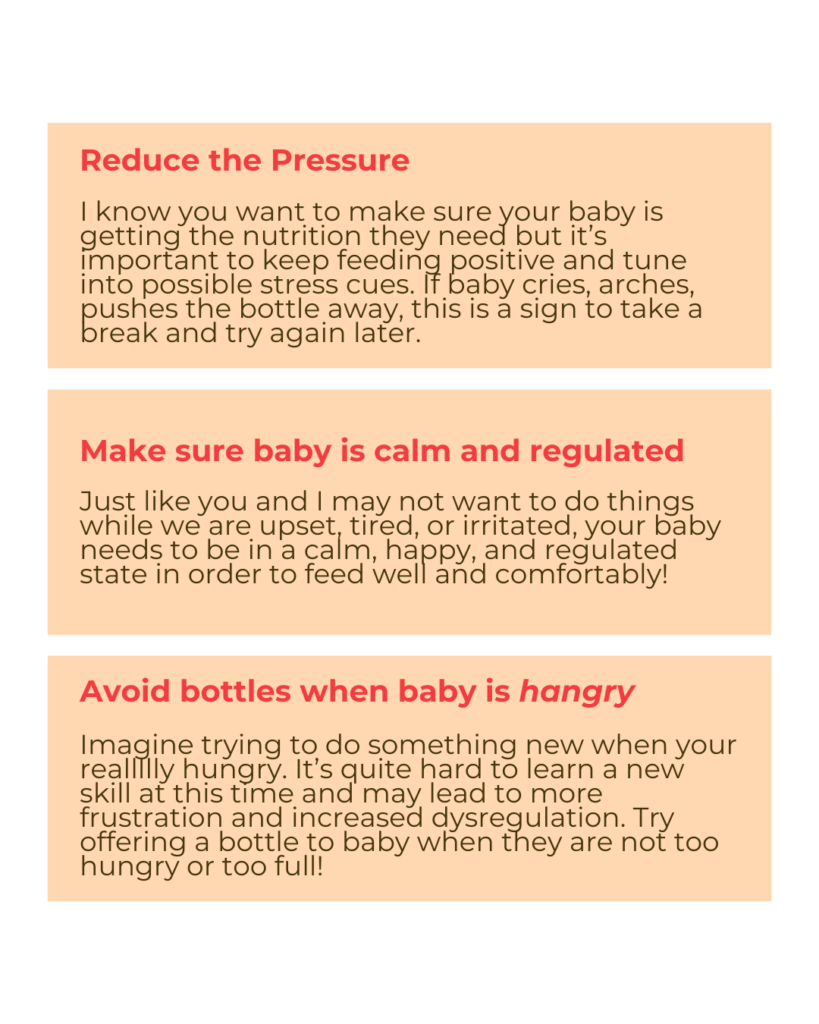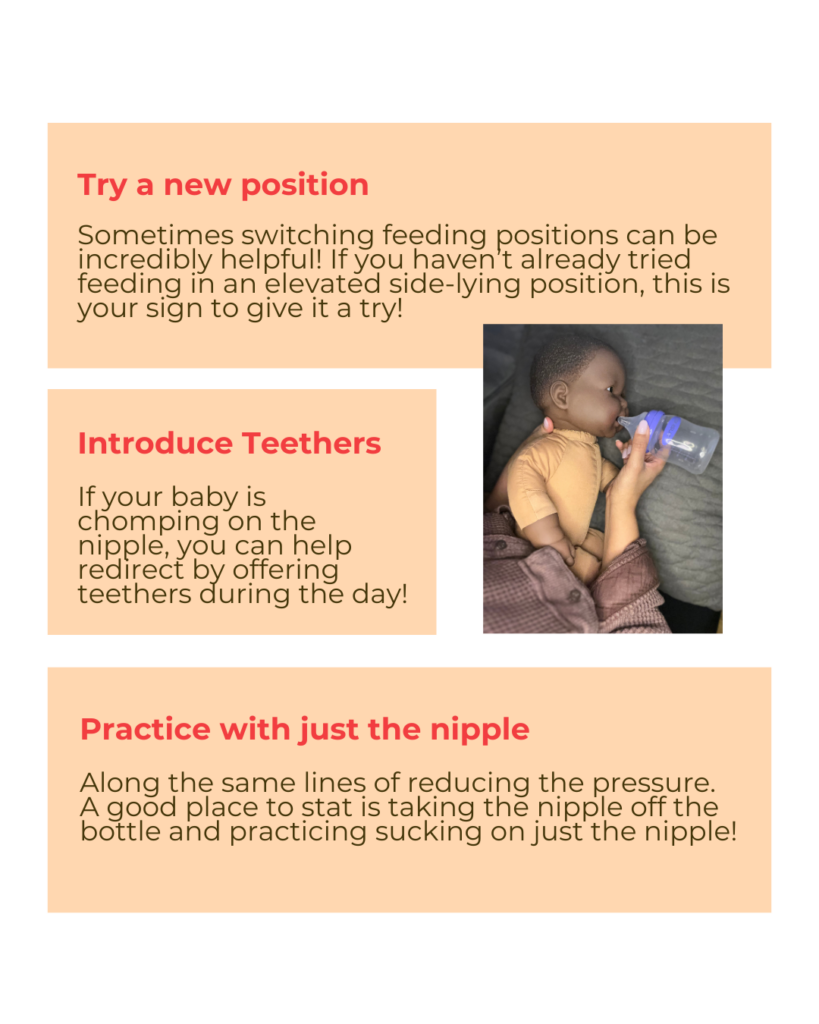
Bottle refusal is a common but frustrating experience for parents. Before you spend money on every bottle on the market, let’s explore what bottle refusal is, why it happens, and how you can help your baby learn to accept the bottle.
What exactly *is* bottle refusal?
“Bottle refusal” describes a baby who may consistently refuse to drink from a bottle, even when hungry. These babies may breastfeed without difficulty but resist or refuse the bottle entirely.
Common signs of bottle refusal include:
- Chomping or chewing on the bottle nipple
- Gagging or fussing when the nipple nears their mouth
- Turning their head away or pushing the bottle away
- Crying or becoming upset during feeding attempts
Why is my baby refusing the bottle?
Many parents are under the impression that trying a different bottles/nipples will help ‘fix’ the refusal, but often there is an underlying reason contributing to refusal. According to research, “bottle-feeding… requires the infant, the parent/carer, and the bottle-feeding equipment to contribute to the process.”1
There are many possible reasons why a baby may refuse the bottle, and sometimes it’s a combination of several different reasons! A few causes for refusal include:
- Age of Introduction
- Typically it’s recommended to introduce a bottle to baby between 3-4 weeks after birth, once breastfeeding has been established. Often, when babies are introduced to a bottle too late, this can contribute to challenges. Even if a baby was introduced as a newborn but then didn’t get bottles consistently past 4 weeks, they can still refuse the bottle! Additionally, the sucking reflex is present at birth, and helps babies feed reflexively. It is triggered when the roof of baby’s mouth is stimulated. This reflex diminishes between 2-4 months, and eventually disappears. Meaning, sucking is no longer reflexive and is volitional. So even if a baby was taking a bottle well before, they may struggle when the reflex is gone if they haven’t mastered the skill or had consistent opportunities to practice! Age of introduction and frequency of bottles offered both matter!
- Tongue Ties & Underlying Oral Motor Difficulties
- It takes a lot of work to coordinate all of a baby’s muscles to feed efficiently! Even if breastfeeding is seemingly going well, babies can compensate and challenges can appear with the bottle once introduced. Sometimes the cause for bottle refusal is related to an underlying oral motor skills and/or tongue tie. They may also have difficulty coordinating breathing and swallowing – this is called the suck-swallow-breathe sequence, and is very important for successful feeding by breast or bottle!
- This is not to say to go out and get a tongue tie release – there are many steps to the process and it is not a quick fix. If you are concerned your baby may have a tongue tie, here’s a quick screener you can download to help you determine if an evaluation would be beneficial.
- Taste of Milk
- Believe it or not, breastmilk can change in taste and consistency when it’s stored in the fridge, freezer, or thawed! Breastmilk that has been thawed may have a soapy or metallic smell or taste. This is related to an enzyme called “lipase,” which is a beneficial enzyme that helps break down fats. The longer breastmilk is stored before being frozen, the levels of lipase increase due to oxidation. Give your breastmilk a sniff and taste to determine if refusal could be related it!
- Stress or Trauma
- Babies can experience stress too! If they have a history of feeding difficulties (like being in the NICU or having a feeding tube), they can experience stress around feeding time. Similarly, if babies are experiencing stress with their body sensations, like reflux, gagging, or difficulty breathing, they can associate this negative feeling with feeding.
- Illness
- Just like you and I may not be interested in eating our favorite foods when we are feeling sick, babies can feel the same way! Illnesses or even nasal congestion can affect our comfort and baby’s ability to feed well.
Now that we’ve identified what bottle refusal is and the reasons why your baby may be refusing the bottle, let’s get to the good stuff – what you can do to help your baby overcome it!
What can I do to help my baby to accept the bottle?
First, let’s discuss the steps to bottle feeding. Looking at the steps can help you identify where your baby is having difficulty and what you may need to work on to help them!
In order to accept and feed from a bottle, babies need to follow these steps:
- See the bottle without crying
- Independently open their mouth and allow the nipple in
- Let the nipple touch and lay against their palate
- Cup the nipple with their tongue
- Seal their lips around the nipple
- Suck, using their tongue to create suction
- Swallow the milk
- Breathe! (and then repeat – suck, swallow, breathe)
All that to say, feeding at the bottle is a skill, just like feeding at the breast! If there is a breakdown somewhere in the process, it’s not that your baby won’t take a bottle, but a sign that your baby is having a hard time learning how to drink from a bottle and can’t (at least not yet!).
Some things to help decrease bottle refusal and improve your baby’s ability to feed from the bottle include:


Note: If your baby is older (5-6+ months), you may try transitioning to a straw or open cup, which is more developmentally appropriate. Bottle feeding is more difficult to master at this age, as the sucking reflex is gone and babies are readying themselves for the next step in their feeding journey! You can learn more about introducing a straw cup to your baby here!
Okay, I’ve tried everything and my baby is still struggling – what now?
If you feel like you’ve tried all the tips and tricks and your baby is still struggling, it may be time to seek professional help. During a bottle refusal consult, we’ll complete a thorough oral motor and feeding evaluation, identify the factor(s) contributing to your baby’s challenges, and trial bottles / feeding that support your baby’s skills and needs. While I can’t guarantee your baby will accept the bottle, we will work together to create a personalized care plan to guide you every step of the way. Book a consultation today and let’s work together to support your baby’s feeding journey!


CDC: Signs your Child is Hungry or Full
Goldfield, E., Richardson, M., Lee, K. et al. Coordination of Sucking, Swallowing, and Breathing and Oxygen Saturation During Early Infant Breast-feeding and Bottle-feeding. Pediatr Res 60, 450–455 (2006). https://doi.org/10.1203/01.pdr.0000238378.24238.9d
Geddes D.T., Sakalidis V.S. Breastfeeding: how do they do it? Infant sucking, swallowing and breathing. Infant 2015; 11(5): 146-50.
1 Kotowski, J., Fowler, C., Hourigan, C., & Orr, F. (2020). Bottle‐feeding an infant feeding modality: An integrative literature review. Maternal & child nutrition, 16(2), e12939.
Leave a Reply Cancel reply
serving parents of babies both virtually and in-person!
Proudly Based in Northern Virginia
Visit Our Clinic in Vienna, VA
501 Church St NE, Suite 211
Vienna, VA 22180
301-615-1343
IN-OFFICE Business Hours
Monday - Thursday: 9:00 AM to 4:00 PM
Friday: 9:00 AM to 12:00 PM
Saturday & Sunday: Closed
Mom & Baby Feeding Groups
Date: Bi-weekly Friday Mornings
Time: 10 am EST
Location: In-Clinic | Cost: Free